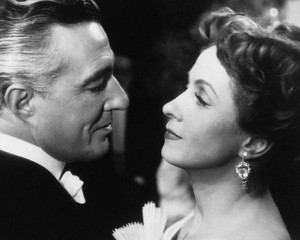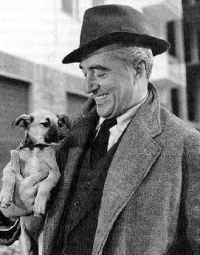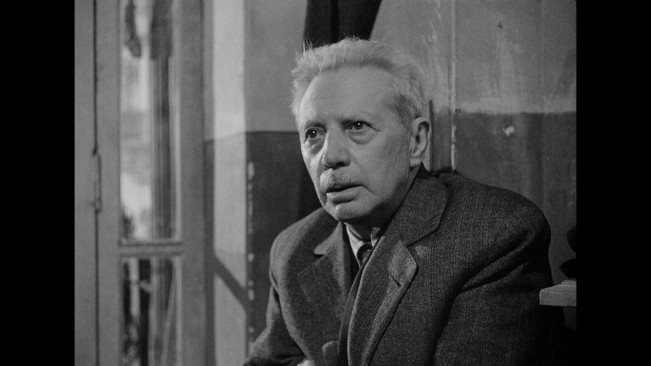

By Mike Wilmington Wilmington@moviecitynews.com
Wilmington on DVDs: Umberto D.
PICK OF THE WEEK: CLASSIC
UMBERTO D. (Also Blu-ray) (Four Stars)
Italy; Vittorio De Sica, 1952 (Criterion)
I. UMBERTO D.
Italy. The early ‘50s. The Post-war era. On a crowded Roman street, a group of old men who live on pensions from the Italian government, try to demonstrate for a raise in their meager incomes. Police break up the march, and the old men scatter, including the neatly-dressed, white-haired man whom we will follow for 88 minutes in the story that has just begun. He is an elderly ex-government worker named Umberto Domenico Ferrari, or “Umberto D.“ for short. Umberto has a threadbare dark suit and sad, watchful eyes and he takes with him, almost everywhere, his little white-and-brown-haired dog, Flike. Like most of the other old men, his situation has become desperate.
Umberto D.‘s pension is not enough to live on. He has no visible family, his resources are dwindling and he is behind in his rent — in the room where he has lived for decades, but from which his cruel, unfeeling and pompously bourgeois landlady has been trying to throw him out, so she can enlarge and redecorate it and double the rent. When the old man goes out during the day, his landlady sometimes, without telling him, rents out his room to couples for liaisons.

Umberto’s only friend, besides Flike, is the house’s pretty, sweet-faced young maid Maria, who treats him as kindly as she can — but who has troubles of her own, including the fact that she is pregnant by an unknown father, one of two soldiers stationed nearby. Meanwhile, Umberto tries to get by — sick and lonely and poor and old, with no relatives to help him, no money to fall back on, and a government “safety net” that is failing him. As we watch (some of us through tears), Umberto D. wages a lonely battle, probably his last, for survival and dignity and , in the end maybe, simply for a few more minutes playing in the sunny park with his little dog Flike.
Umberto D., the much-loved, sometimes-criticized Italian film masterpiece by director-writer Vittorio De Sica and his frequent screenwriter Cesare Zavattini is a brilliant, heartfelt movie drama about the kind of subjects the movies usually avoid: loneliness and defeat and poverty and society’s sometimes scandalous neglect of the old and needy. These and similarly distressed people are of course among the ones whom wealthy presidential candidate Mitt Romney, in the last campaign, dismissed as the perhaps undeserving “47%,” dependent on government handouts, and of whom the well-off TV commentator Bill O‘Reilly (who’s looking out for us), was perhaps speaking in his post-election analysis of voter/moochers who want “stuff.” These people deserve better, in life as well as in the movies.
De Sica and Zavattini, who had earlier joined forces to make the postwar neo-realist film classics Shoeshine and Bicycle Thieves — to great critical acclaim and a pair of foreign language film Oscars — combined here again for a film of almost annihilating humanity and empathy. No other movie in the history of cinema has shown the plight of the aging, or of the impoverished and solitary individual with more feeling and compassion. In beautifully written and beautifully staged and acted black-and-white images (shot by Aldo Graziati), we watch, with increasing anxiety and mounting sadness, Umberto’s deepening predicament, the way his world is being dismantled and disassembled before his eyes. The ending of the story is a climax and an epiphany no one forgets.

Umberto D. is, together with Leo McCarey’s lesser-known 1937 American movie Make Way for Tomorrow, the screen’s most powerful indictment of ageism. But, on its release in 1952, even though De Sica was at the height of his world cinematic fame, the film initially failed with both the public and the critics. It was also attacked by the Italian government through its official cinematic representative, Giulio Andreotti, the bureaucrat who controlled state loans for movie production. (Andreotti’s charge: Umberto D. was airing dirty linen in public.) Though Umberto D is now generally accepted as a classic of cinema, it still gets attacked from both the right and the left of film culture — the right belaboring it as overly pessimistic, the left as insufficiently committed to class struggle, while, in the middle, some cinephiles damn it as insufficiently cinematic and overly sentimental.
They are all wrong, and Umberto D. has survived them all. But their arguments are still with us.
Don’t allow any of the nay-sayers to keep you away from the film, especially if you haven‘t seen it yet. Umberto D., which Ingmar Bergman once called his favorite film of all time, is a genuine masterpiece: compassionately and truthfully written, humanely and brilliantly directed and blessed with a remarkable cast — only one of whom (statuesque Lina Gennari as the social-climbing landlady) was a professional. Of the others, Carlo Battisti, who plays Umberto, was a distinguished Roman linguistics professor, and Maria Pia Casilio, who plays the maid Maria, was a seamstress’ assistant.
The performances De Sica gets from them — like the moving and memorable work by the non-professional actors in Shoeshine and Bicycle Thieves (by factory worker Lamberto Maggiorani), are quietly naturalistic, and wholly believable. (The professional, Gennari‘s landlady, is full of false affectations, but they fit her character.) The rest of the cast — Umberto‘s fellow pensioners, his fellow patients, doctors and nuns at the hospital where Umberto stays for a case of tonsillitis, the landlady’s snobbish friends, the owners of a crowded dog hostel where he tries to leave Flike, and the little girl to whom he tries to give his dog — are all amatuer actors, “ordinary” people. De Sica guides them all masterfully, as he does Battisti and Casilio.
2. VITTORIO D.
 Vittorio De Sica came from a middle class family in Naples; his father had a lower-income job. According to Ephraim Katz‘s Film Encyclopedia, De Sica himself began as an office clerk. But Vittorio’s striking good looks and appealing personality soon gave him another career, as a stage and movie actor. Before he began directing in the ‘40s. De Sica had become one of Italy’s most popular movie matinee idols of the ‘30s and ‘40s. (A sort of Italian Cary Grant, he specialized in light drawing room comedy.) And he was a star international character actor throughout his directorial career. His finest performances were as Baron Donati in Max Ophuls’ elegant romantic drama The Earrings of Madame de… and as Bardone, the swindler who masquerades as the heroic general in Roberto Rossellini’s World War II prison drama General Della Rovere. His most admired works as a director were Shoeshine, Bicycle Thieves, Miracle in Milan, Umberto D., Two Women and The Garden of the Finzi-Continis.
Vittorio De Sica came from a middle class family in Naples; his father had a lower-income job. According to Ephraim Katz‘s Film Encyclopedia, De Sica himself began as an office clerk. But Vittorio’s striking good looks and appealing personality soon gave him another career, as a stage and movie actor. Before he began directing in the ‘40s. De Sica had become one of Italy’s most popular movie matinee idols of the ‘30s and ‘40s. (A sort of Italian Cary Grant, he specialized in light drawing room comedy.) And he was a star international character actor throughout his directorial career. His finest performances were as Baron Donati in Max Ophuls’ elegant romantic drama The Earrings of Madame de… and as Bardone, the swindler who masquerades as the heroic general in Roberto Rossellini’s World War II prison drama General Della Rovere. His most admired works as a director were Shoeshine, Bicycle Thieves, Miracle in Milan, Umberto D., Two Women and The Garden of the Finzi-Continis.
As a director, De Sica had what Orson Welles described as a truly rare, enviable directorial gift (“ What De Sica can do, I can’t do.” Welles once said. “I ran his Shoeshine again last night and the camera disappeared, the screen disappeared ….It was just life.”) De Sica gets this effect of utter unforced naturalism through the genius and sensitivity of his work with the actors, the depth and truthfulness of his and Zavattini’s scenarios, and the marvelous realism of his deep-focus compositions and staging. (Watch the believably busy background characters in a De Sica long shot some time. It’s a revelation.)
Though he is often accused of sentimentality, it’s a false charge. Sentimentality has been accurately described (by Norman Mailer) as the “emotional promiscuity of the (basically) unemotional.” But anyone who cannot feel De Sica’s emotion in his great neo-realist films is callous. Anyone who can not see his reality is blind, Anyone who cannot hear his message of humanity is deaf. I grew up in what we call reduced circumstances, with a working single mother who was also treated badly by the bourgeoisie of her city, and De Sica is one of the few filmmakers I’ve seen who gets poverty right. His films are political — he and Zavattini both were committed leftists — but they are also honest and superbly, eloquently made.
Unfortunately, Umberto D. was the last of De Sica’s and Zavattini’s neo-realist masterpieces, even though they continued to work together for the rest of De Sica’s career and life. The assaults on Umberto D. by Andreotti and the others took their toll. So did the attacks by the misguided leftist critics who, if they had a brain in their heads, should have greeted Umberto D. with hosannas. And so, unhappily, did the destructive effects of De Sica’s one great personal flaw: the life-long addiction to casino gambling that kept him in financial hot water, and made it necessary for him to recoup his losses by directing one (beautifully made) big-star project after another, often with his good friends and collaborators, and consummate professionals, Marcello Mastroianni and Sophia Loren. Those films were good. Yesterday, Today and Tomorrow and Marriage, Italian Style are fine, even wonderful, films. But Bicycle Thieves and Umberto D. can change your life.
 He remains I think one of the cinema‘s great artists, but the métier and the characters and the type of story that he loved best and felt most deeply were mostly denied him after 1952. It was much easier for him and Zavattini to put together a big-budget project with Mastroianni and Loren than to painstakingly create a low or medium-budget one with the non-professionals and ordinary people he could guide so magnificently. I erred by the way in saying that Lina Gennari was the only professional among the principals here — as my friend Stuart Klawans reveals (along with much else that I’ve used here) in his excellent essay for this Criterion release of Umberto D. The other professional in the movie was Napoleone, who played Flike — the little dog who eats his master’s scraps, follows him faithfully and dances in the sunlight — and played him perfectly..
He remains I think one of the cinema‘s great artists, but the métier and the characters and the type of story that he loved best and felt most deeply were mostly denied him after 1952. It was much easier for him and Zavattini to put together a big-budget project with Mastroianni and Loren than to painstakingly create a low or medium-budget one with the non-professionals and ordinary people he could guide so magnificently. I erred by the way in saying that Lina Gennari was the only professional among the principals here — as my friend Stuart Klawans reveals (along with much else that I’ve used here) in his excellent essay for this Criterion release of Umberto D. The other professional in the movie was Napoleone, who played Flike — the little dog who eats his master’s scraps, follows him faithfully and dances in the sunlight — and played him perfectly..
By the way, the name of De Sica’s lower-income Neopolitan father was Umberto. Umberto De Sica.
Extras: Documentary That’s Life: Vittorio De Sica (2001); 2003 Interview with Maria Pia Casilio; Trailer; Booklet with Stuart Klawans’ essay, and memoirs by Battisti and Vittorio De Sica.















Umberto D is, for me, the most effective and accessible of the Italian Neo-Realist films. I admire many of them, but where some are dry exercises, this one immediately sucked me in and wouldn’t let go. It is, as it seems to have been for you, one of my greatest movie experiences.